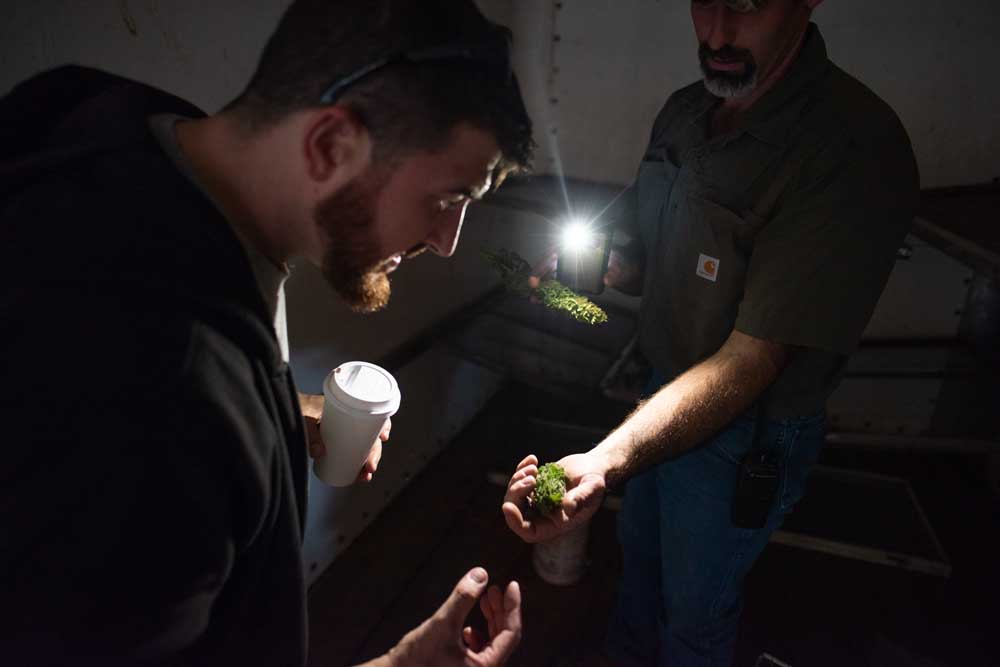CBD industry sprouts in Clatsop County
Published 3:00 pm Wednesday, September 18, 2019

- Thomas Epler, of CB Dilley Hemp Farm, shows his brother-in-law, Oscar Nelson, a bud of dried hemp.
Tiffany Nelson started out making products laced with THC, the psychoactive component in marijuana, to help a friend with cancer. With the legalization of hemp, she developed a nonpsychoactive lotion using its extract CBD, or cannabidiol, commonly touted for its potential to treat pain and other conditions.
“It’s just pain relief without the highness,” she said.
Last year, Nelson and her husband, Oscar, started Astoria CBD Co., joining a growing collection of locals cultivating hemp and marketing the extract in value-added products.
Clatsop County has five registered CBD handlers and growers, according to the state. They range from smaller operations like Nelson to Tweedle Farms, a vertically integrated farm in Jewell that grows high-CBD, nonpsychoactive hemp strains, selling them as smokeable flowers and bath bombs, tinctures, capsules and waxes.
Nelson sources her hemp from CB Dilley Hemp Farm in Forest Grove, where her brother-in-law, Thomas Epler, and his family grow 5 acres of hemp amid a 420-acre nursery. CB Dilley pales in comparison to the 50-acre hemp farm down the road from his operation, Epler said.
“You go down to St. Paul, Woodburn, and they’re running 150, 250, 500 acres,” Epler said. “Then you go down to Grants Pass, Medford, Ashland, they’re ripping out (500), 600-acre fields and putting hemp in.”
Most state hemp pilot programs have operated under rules passed in the 2014 Farm Bill. The 2018 Farm Bill, signed in December by President Donald Trump, legalized the cultivation and sale of hemp under federal law and directed the U.S. Department of Agriculture to issue regulations and guidance.
Oregon went from 13 certified growers and handlers in 2015 to 584 growers and 212 handlers in 2018. In 2019, the number of growers exploded to more than 1,900, and the number of handlers to nearly 500.
“I never thought I’d do this job,” said Jose Chiquito, a farmhand at Epler’s farm for 30 years, while stripping broken hemp branches of their foliage. “But now it’s legal.”
Harvest season
Hemp harvest season has begun. CB Dilley, with six or seven permanent workers, brings in between 30 and 40 people to help pick, dry and trim hemp, Epler said. Most of his harvest goes toward CBD oils, with a smaller amount for buds.
Epler prides himself on his family’s ability to turn out high-CBD strains with an imperceptible amount of THC. Growers and hemp companies are tested to ensure products have less than the allowable 0.3% of THC content.
The USDA recently submitted draft rules for the national production of hemp to the White House’s Office of Management and Budget for approval. The rules are meant to clarify the legal definition of hemp as a commodity crop and reinforce its removal from the Drug Enforcement Agency’s list of controlled substances.
Epler sees the hemp industry exploding as the rules are finalized and prohibitions lifted on CBD in food and other products.
“It took so long to allow industrial hemp to begin with,” Epler said. “It still has that stigma of Cheech and Chong.”
In addition to Nelson, Epler supplies Kirsten Norgaard, who runs Kit’s Apothecary in downtown Astoria. Norgaard, like Nelson, started experimenting with personal THC-infused products before moving into CBD a few years ago.
“THC has great benefits too,” she said. “But sometimes you need to kill the pain but not be high.”
Her shop carries several CBD products, from creams and tinctures to gummy candies and chocolates. She has several CBD-infused kombuchas on tap and makes nonalcoholic CBD cocktails.
When she first started, Norgaard said, there was little oversight of CBD products. The state Department of Agriculture stepped in to oversee the hemp industry, certifying growers and handlers, she said.
“Which is good, because it just shows that the people who are growing, making products, actually handling the flower itself, are under some form of regulation,” she said. “You actually know what you’re getting. So I think it’s a good thing.”
Mainstream
Many handlers have gone big as CBD and hemp products have gone more mainstream, from hemp seed hearts sold in grocery stores to CBD shots added to coffee, alcohol and other drinks. Tigard-based CBD startup Strength of Hope recently signed a contract to market its products in CVS pharmacies.
The U.S. Food and Drug Administration still considers CBD a prohibited substance in any food or dietary supplement for humans or animals.
“There is still a significant amount of missing data to better understand the effects on human exposure and the long-term effects of regular consumption,” Cara Welch, a senior adviser in the FDA’s Center for Food Safety and Applied Nutrition, told attendees at a recent conference of the American Herbal Products Association.
The FDA is also concerned about unsubstantiated health claims that CBD cured everything from Alzheimer’s disease to cancer, Welch said. The FDA has not approved any marketing of cannabis for the treatment of a disease or condition, although it has approved one cannabis-derived prescription drug, Epidiolex, for treating seizures.
The big breakthrough in the CBD industry will be when the agency starts regulating it more like a dietary supplement, Norgaard said.
“It would be a huge advancement, because then it could go in anything,” Norgaard said. “Thankfully, in Oregon, we’re able to put it in food. And hopefully the rest of the country follows suit.”
The FDA has issued warning letters to companies marketing CBD products for therapeutic or medical uses. Marketing in the CBD business is largely through word of mouth. Nelson sells her products at a few shops locally and online.
“Everybody finds me,” Nelson said. “It’s usually — just like the cannabis people — they find it, because it’s their last resort. They’ve tried everything.”





